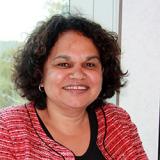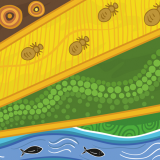‘I have just felt really privileged for most of my life, I love my work, I love what I do, and I really enjoy the people I work with, and it comes from spending part of my career in medical research. It just gives you a lot of flexibility and opportunities that you don’t get with standard clinical hospital jobs or general practice.’
In the small world of health and medical research, the name Professor Sandra Eades is mentioned—and seen—frequently. Throughout her career, Sandra has experienced and contributed to numerous significant changes that have improved national health outcomes, especially for Aboriginal and Torres Strait Islander Australians.
Sandra, a Noongar woman from Mount Barker in Western Australia, was the first in her family to complete high school. She left home at a tender age to study medicine across the country at the University of Newcastle, which at the time only had three other Indigenous medical students.
‘It puzzled some of my cousins, it just wasn’t the norm,’ Sandra explains. ‘My oldest brother thought I’d get homesick and come home after the first term and not actually finish, so he was actually very surprised when I would get back on the plane to go to uni after my term break.’
However, Sandra was fortunate to have a proud and supportive community behind her. After completing her medical degree, she finished her internship in Newcastle, before moving back to Perth to complete her registrar years.
Although loving her profession, Sandra said she found it difficult to handle the lurid side of medicine.
‘It wasn’t because I didn’t love what I did and I didn’t want to do medicine…I thought “Oh my God! I’m a bit of a fainter and I’m studying medicine!”—I stayed in the hospital for three years, but I was never totally comfortable, you know, stitching people up or doing procedures such as inserting chest tubes for people who had a pneumothorax or central lines for people seriously ill.’
After her hospital service, Sandra worked as a general practitioner (GP) for the following seven years and also worked for the Perth Aboriginal Medical Service. It was during that time that her research career fate was sealed when she met Fiona Stanley—one of Australia’s most prominent medical researchers.
'We discussed my interest in child and public health and I joined the Telethon Kids Institute, which Fiona led. At this time I also enrolled in a part-time PhD which focussed on the health of urban Aboriginal infants and their mothers,’ Sandra explains.
'During my GP work, I first experienced medical practice with people facing profound poverty and homelessness and who were sleeping under the bridges in inner city Perth. I also became increasingly frustrated by my inability to make lasting changes to Aboriginal peoples’ health and circumstances in day-to-day practice. I gradually moved across to full-time medical research but continued to draw on my experiences in my home community as well as working in general practice with Aboriginal people from metropolitan Perth.'
Sandra was interested to explore ways to find new or improved treatment and management options for very real health problems that also address the dire social circumstances that many of her Aboriginal patients experienced.
She became the first Aboriginal medical doctor to receive a PhD. Her research investigated the causes and risks for Sudden Infant Death Syndrome (SIDS) and serious infant illnesses within Aboriginal communities in Western Australia. Through her project, Sandra discovered, and brought to attention, the high incidence of Indigenous women smoking while pregnant. This discovery opened the doors to intervention programs and support for pregnant Indigenous women. Sandra now focuses her research in maternal and child health, which wasn’t a well investigated area or a priority when she began.
Sandra’s long list of accomplishments influenced the community greatly, from leading early efforts to reduce the impact of smoking on Aboriginal peoples’ health to writing policy documents for the Department of Health on improving maternal and child health.
One of Sandra’s most important achievements was her leadership role in the development of NHMRC’s Road Map, a guide for improving Aboriginal and Torres Strait Islander health through research. It was through the development of Road Map, and discussions with NHMRC, that five per cent of NHMRC’s annual funding is now committed to Aboriginal and Torres Strait Islander health and medical research to improve health outcomes.
Sandra became involved with NHMRC quite early on in her career, sitting on Aboriginal and Torres Strait Islander health grant review panels and on numerous committees focussed on improving Aboriginal and Torres Strait Islander health outcomes. She is now chair of the Principal Committee Indigenous Caucus (PCIC), which provides advice to NHMRC on issues in Indigenous health research and also sits on NHMRC Council as the member with expertise for Aboriginal and Torres Strait Islander health.
Sandra says that research has both built upon her medical degree and added to her knowledge. She highlights the fact that research is needed to ‘revolutionise medicine, as without it, treatment and management might not be as effective as it is today.’
For undergraduates, Sandra recommends getting involved in the research world by seeking out short-term research opportunities with a researcher doing an honours project or Masters’ thesis, or an undergraduate research project. For postgraduate students, Sandra suggests trying out a research- based degree, for example, Master of Public Health or Diploma in Clinical Epidemiology, and definitely a PhD. Additionally, Sandra thinks seeking out international opportunities would be particularly beneficial.
Sandra continues to assist new researchers with their careers and encourages them to network with other Indigenous researchers.
‘It’s one of the things I really enjoy doing now, looking out for people to mentor and support. It’s important to encourage them to believe in themselves—not to think that people like me should always be the only people whose voices are heard—but to create the best training pathways and hear the voices of other new up and coming Aboriginal researchers—because they need to take over.’
She is keen to pass along her knowledge to the next generation of researchers so that they might have the best opportunity to become leaders and pursue important research. Her goal is to mentor and guide those who will eventually take the reins and continue on the path that she and others have paved. Sandra is enthusiastically looking forward to the future and the ‘explosion of opportunity’ within health and medical research.


